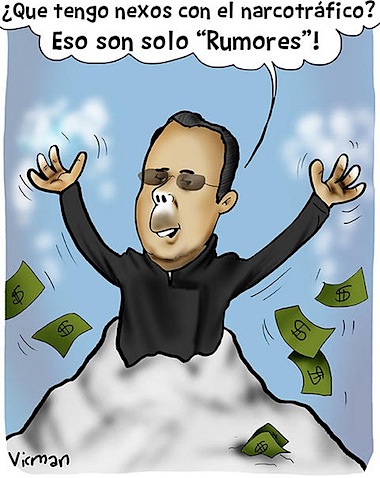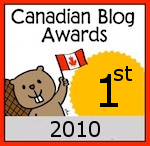
“I have ties to narcotrafficking? Those are just rumors!” Sure, Jota-Jota…we believe you.
The more one looks at Juan José Rendón, the more this silly “samurai” takes on a sinister overtone. Because according to J.M. Karg, a journalist based in Buenos Aires, wherever Jota-Jota goes, drug money is not far behind:
Following the recent denunciation of ties between political advisor J.J. Rendón and Colombian narcos, which resulted in Rendón’s withdrawal from the re-election campaign of Colombian president Juan Manuel Santos, Latin American public opinion once more debates the relationship between two worlds that seem separate, but whose interrelatedness continues to grow: politics and narcotrafficking. Which directors have been questioned over probable ties with money stemming from this merchandise? And why is the collaboration between these two spheres increasing?
It is known that the world of narcotrafficking and its lavish generation of monetary liquidity at low cost and amazing speed, has brought various political campaigns to involve themselves with this wasteland of illegality. Some leaders seem to prefer to pay the political cost which the revelation of this connection could signify, as long as they have important funds to compete in elections, whether internal — within their own party — or general — for executive and or/legislative offices in each country. On the other hand, it guarantees a certain juridical “impunity” to be able to operate, creating a kind of “virtuous circle” in which both parties benefit in the short term. The problem, clearly, is the revelation in the medium to long term, and its possible juridico-mediatic repercussions, to the point where political careers end or those involved go directly to prison.
The Colombian capo, Javier Antonio Calle, was the one who revealed, from the United States, that Rendón had received, over the last three years, $12 million from the three biggest narcotraffickers in Colombia, supposedly to get an agreement for surrender in exchange for no extradition [to the US], from the Santos government for them. The non-consummation of the plan does not negate Calle’s revelation: the ties between Rendón and these events, now under investigation by Colombian justice.
Do these facts soil only the campaign of Juan Manuel Santos? In no way. Rendón has advised, during these years, a handful of well-known political leaders in various countries: Peña Nieto in Mexico, Capriles in Venezuela, Juan Orlando Hernández in Honduras, Santos himself — and also Uribe — in Colombia, De Narváez in Argentina, and Quijano in El Salvador. If the current denunciation comes at a time of collaboration between Rendón and Santos, this revelation indirectly taints all those leaders, who also share a conservative vision in the politico-economic ambit. Why? No relation of this type comes overnight, and the hypothesis that Rendón had begun in these last few months to have dealings of this sort is certainly not very factual — or credible.
Two cases can serve as examples to illustrate what we have said. Firstly, the declaration of a former DEA chief in Mexico, Phil Jordan, who, following the arrest of the narco-capo “Chapo” Guzmán, appeared surprised by the case, saying that “I never thought that the PRI [party] would arrest him, because ‘Chapo’ Guzmán gave a lot of money to the Peña Nieto campaign. He has always been involved in politics by way of money.” After that, Jordan stated that the ties between Guzmán and the PRI are documented in US intelligence reports. The circle appears to close: Rendón has been heavily involved as advisor to the Peña Nieto presidential campaign.
Secondly, the parliamentary deputy Francisco de Narváez was investigated by Argentine authorities for his suspected ties to Mario Roberto Segovia, of Rosario, sentenced in 2012 to 14 years in prison for 91 shipments of ephedrine to Mexico. What happened next? Years later, from a telephone registered to De Narváez, three cellphone calls were made to Segovia, according to a report by the newspaper La Capital de Rosario. While testifying as a witness in the case, De Narváez said he did not make those calls, although he admitted that the telephone from which they were made did indeed belong to a group of them registered to him, thus recognizing the connection indirectly. Who advised De Narváez during the 2011 campaign? J.J. Rendón, of course.
Following these new revelations over Rendón, there remain many open questions about the connectionsn between the “narco” world and the politics of our continent, a complex, non-linear relationship with unpredictable consequences in the medium and long term, with the political and media sensitivity which these cases generate. Certainly, for every revelation made in the matter, such as those we describe in this article, numerous other connections are not visible; in this way, the various directors are “protected” from the possible media and judicial implications which new revelations could bring to bear. Is it possible, in the judicial ambit alone, to regulate the linkage between both spheres, with the goal of putting an end to a phenomenon which seems to have spread throughout the continent? Will the interrelation keep growing, assuring “mutual benefits” to all parties?
Translation mine.
So it’s not only in Colombia that drug money has been tied to Rendón’s “political” work. Argentina and Mexico, likewise, have seen him tied to politicians with well-established drug connections. Is it really so shocking, then, that a group of well-heeled Colombian narcotraffickers have seen fit to call on him to act as go-between in their attempts to negotiate with the local government?
And just to underscore how serious the charges against Rendón are, now there’s word out of Venezuela that he’s under investigation for money-laundering, as announced by attorney-general Luisa Ortega Díaz.
Gee, for mere “rumors”, there sure is a lot to substantiate all that idle gossip!



